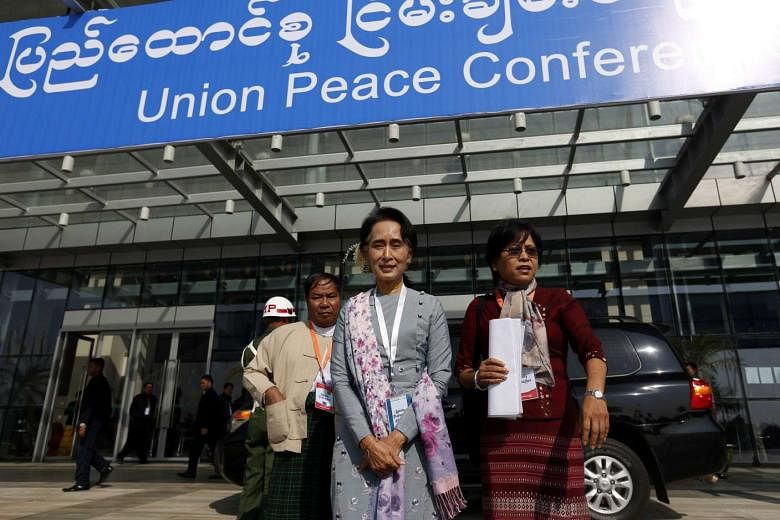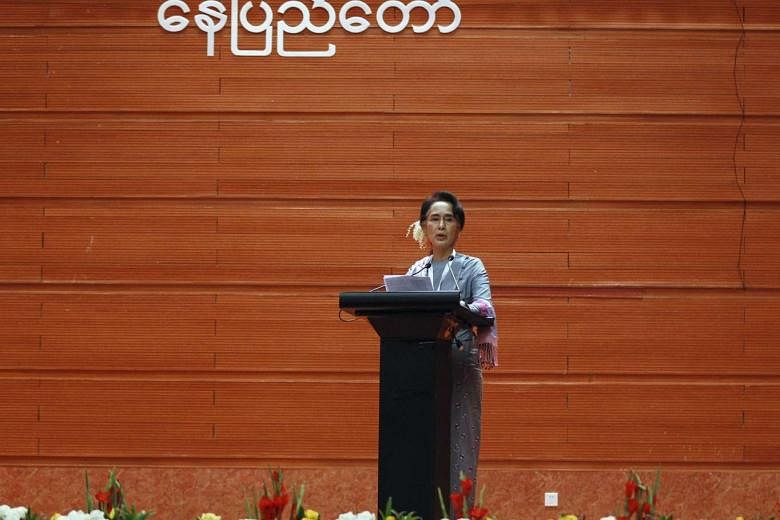NAYPYIDAW (AFP) - Myanmar's Ms Aung San Suu Kyi addressed ethnic armed groups on Tuesday (Jan 12), promising to use her party's popular mandate to drive Myanmar's peace process as she outlined a vision of a federal future to ethnic rebels who have battled for decades.
She was speaking at a fresh round of talks between the government, army and ethnic minority armed groups, at which crucial economic and social issues that spurred the violence will be discussed.
Those include the ownership of natural resources, seen as a major factor in conflicts that have displaced tens of thousands of people and cost countless lives.
Ms Suu Kyi, whose party won the November general election, said she was optimistic the "fighting will be finished soon" if the nation's political standards are improved and all groups work together.
"We cannot build lasting peace without national reconciliation," she said. "Now we are ready to lead the peace process, because we have the power invested in the mandate given to us by the people and ethnic minorities."
She also said that "a real democratic federal nation" was possible if all ethnic groups cooperate in a spirit of "brotherhood and respect".
It was the first time the democracy champion had taken a leading role in years-long official peace efforts, after she outlined peace as a priority for her government when it takes power in March.
Ms Suu Kyi gave the opening speech at the talks in the capital Naypyidaw.
It was a rare appearance for the democracy figurehead at the years-long peace process, which has been steered by the country's reformist post-junta leadership.
The prisoner-turned politician has said ending decades of conflict between the military and a myriad of ethnic rebels will be the "first ever duty" of her government.
Mr Hkun Okker, a member of the committee overseeing the peace dialogue, said Ms Suu Kyi had accepted an invitation to deliver opening remarks.
"Aung San Suu Kyi said she would make the peace process a priority and we are very encouraged by her words," he told AFP.
President Thein Sein and powerful army chief Min Aung Hlaing are also slated to attend the five-day talks.
However, some major armed rebel groups have shunned the talks, with clashes ongoing in parts of the country.
Political dialogue is a central demand of the ethnic armed groups, who have fought for greater autonomy in the country's mountainous and resource-rich borderlands for generations.
The painstaking negotiations have until now been steered by reformist President Thein Sein, who was also present at the talks in the national capital Naypyidaw.
In October, those efforts yielded a ceasefire with some rebel groups, but Mr Thein Sein craves a binding nationwide truce.
However, deep challenges remain. Some major armed groups have shunned the talks altogether and clashes are continuing in parts of the country between rebels and soldiers.
Powerful army chief Min Aung Hlaing also spoke at the opening of the five-day talks, calling the meeting a "historic event" which could help bring "lasting peace, stability and security" for the country.
Ahead of last year's election, analysts predicted Ms Suu Kyi's National League for Democracy (NLD) would struggle to win seats in ethnic areas.
But the NLD gained a thumping majority across the regional and national parliaments.
Questions remain over her uneasy relationship with the nation's still hugely powerful military, who hold the key to securing a lasting peace.
Several major ethnic armies, including in war-torn northern Kachin and Shan states, have refused to sign up to a national truce until all groups are brought into the deal - notably smaller organisations locked in conflict with the military.
Mr Tun Zaw, spokesman for the United Nationalities Federal Council which represents six armed groups, said his organisation was boycotting the talks because they lack "inclusively".
Myanmar's army partially justified its near half-century stranglehold on the nation because of fears that ethnic divisions would fracture the nation.
It has taken part in much of the peace process, but has continued to fight against rebels in some parts of the country.
A report in the state-backed New Light of Myanmar last week said several soldiers had died in recent clashes in western Rakhine state, adding that the military had vowed to continue its offensives "until the area is cleared of all insurgents".


